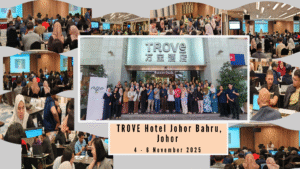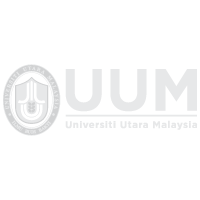POST-TRAINING REPORT
MSPO SIA BASIC TRAINING
28 – 30 October 2025 | Kinta Riverfront Hotel, Ipoh, Perak
Prepared by OSHISIS Solution PLT
1. Training Overview
The MSPO SIA Basic Training was conducted from 28 to 30 October 2025 at Kinta Riverfront Hotel, Ipoh, Perak, participated by representatives from various MSPO-certified entities and related industries.
This programme aims to strengthen participants’ competency in conducting Social Impact Assessments (SIA) based on the MSPO Standards, focusing on:
- Understanding SIA principles and requirements
- Learning to apply the Fundamental SIA Checklist
- Conducting case-study assessments
- Developing Management Plan, Mitigation & Monitoring Plan
- Preparing a complete SIA Report
Training delivery was supported by the MSPO SIA Learning Toolkit, an interactive web-based module accessible at:
🔗 https://oshisis.com/docs/mspo-basic-sia-training-learning-toolkit/
2. Participant Attendance
Total Participants: 55
The list of participants is based on the uploaded attendance file
| NO | PARTICIPANT NAME | ID NUMBER |
|---|---|---|
| 1 | MOHAMMAD ASYRAF BIN SHARIN | SIA250014 |
| 2 | MOHD HAKIMIE BIN LEMAN | SIA250015 |
| 3 | MUHAMMAD RAYMOND BIN JUNE | SIA250016 |
| 4 | NUR SYAHIDA BINTI ROSLEE | SIA250017 |
| 5 | SITI KHAIRIYAH BT HUSSIN | SIA250018 |
| 6 | MOHAMMAD ANWAR BIN JAHURI | SIA250019 |
| 7 | ADIBAH BINTI ZAABAH | SIA250020 |
| 8 | NORHAFIDA BINTI NORDIN | SIA250021 |
| 9 | CHEN KOK SHING | SIA250022 |
| 10 | LAI WEI JUE | SIA250023 |
| 11 | MOHAMAD EIZALF BIN MOHMAD JAAFAR | SIA250024 |
| 12 | ANIS FARIEDA BINTI SHARUDIN | SIA250025 |
| 13 | NG JEN YING | SIA250026 |
| 14 | TAN WAI LENG | SIA250027 |
| 15 | MUHAMMAD SYAFIQ ZAFRAN BIN KAMARUDZAMAN | SIA250028 |
| 16 | NOR HISHAM BIN ZAYAN | SIA250029 |
| 17 | TS. DANIAL MARZUK BIN YASSIN | SIA250030 |
| 18 | NOR SOLEHA BINTI ZAINUDIN | SIA250031 |
| 19 | SEOW TZE KUI | SIA250032 |
| 20 | FARAH NAJIHAH BINTI HAMIDI | SIA250033 |
| 21 | NABILA NAJWA BINTI MOHAMED AZAMI | SIA250034 |
| 22 | BAITY NUREDREEN BINTI ISMAIL | SIA250035 |
| 23 | ABDUL SYARIF NAJIB BIN SHAHIDAN | SIA250036 |
| 24 | MOHAMAD HARIS BIN ABDUL KHAIR | SIA250037 |
| 25 | MOHD. RAIHAN BIN BOLHASAN | SIA250038 |
| 26 | NUR AISHAH BINTI ZAINUDDIN | SIA250039 |
| 27 | SITI SHAKIRA NABILA BINTI MOHD SUHAIMI | SIA250040 |
| 28 | SHARMA HASRIZAL BIN MANSOR | SIA250041 |
| 29 | WAN NUR AIMY NADIAH BINTI WAN SOLAH | SIA250042 |
| 30 | NURUL SAZWANI BINTI MISHUAN | SIA250043 |
| 31 | MOHD SHAHRULL BADRI BIN MOHD SALEH | SIA250044 |
| 32 | SARAVANAGANES A/L NATARAJA | SIA250045 |
| 33 | NOOR AISHAH BINTI YAHAYA | SIA250046 |
| 34 | ROSMAWATI BINTI MOHD TAJUDIN | SIA250047 |
| 35 | NG CHOR HOR | SIA250048 |
| 36 | MUHAMMAD DANIEL BIN HAMDAN | SIA250049 |
| 37 | NOOR HIDAYAH BINTI ABDUL WAHAB | SIA250050 |
| 38 | ELANTIRAYAN GENASAN | SIA250051 |
| 39 | IDRIS BIN JALANI | SIA250052 |
| 40 | YULIANNA | SIA250053 |
| 41 | TONG WING CHUEN | SIA250054 |
| 42 | NOR ANIS DAHLIA AGUS BINTI FAISAL | SIA250055 |
| 43 | ANISAH FASIHA BINTI MUSTAFFA | SIA250056 |
| 44 | MOHD AMIRUL BIN SAFARI | SIA250057 |
| 45 | MUHAMMAD NAIM BIN RAMLAN | SIA250058 |
| 46 | MOHD ANIQ SYAFIQ BIN ROSLAN | SIA250059 |
| 47 | ADI A/L LI | SIA250060 |
| 48 | SHAH RIZAN BIN SULAIMAN | SIA250061 |
| 49 | MOHD KAMILHAKIM BIN DESA | SIA250062 |
| 50 | SHAHRIZAL BIN MOHAMMAD | SIA250063 |
| 51 | VIGNESWARAN A/L NALLAIAH | SIA250064 |
| 52 | CHOW WAI HOONG | SIA250065 |
| 53 | SABARINAH BINTI MOHAMMAD SABARUDIN | SIA250066 |
| 54 | KUMAR A/L KRISHNAN | SIA250067 |
| 55 | NURUS SHAM BIN JAMAL | SIA250068 |
3. Training Delivery Methodology
The session used a combination of:
a. Instructor-led Delivery
- Interactive lectures
- Real-time demonstrations
- Practical walkthrough of SIA workflow
- Group discussions and Q&A
b. Case Study Assessment
Participants were required to complete:
- Fundamental SIA Checklist
- Impact Identification Exercise
- Management Plan Formulation
- Mitigation & Monitoring Plan
- Full SIA Report (Short Form)
c. Digital Learning Integration
Participants accessed the SIA Learning Toolkit, which includes:
- Microlearning modules
- Downloadable templates
- Sample case studies
- Interactive guidance notes
- Simplified workflow and process map
This blended approach allowed participants to learn at their own pace while applying knowledge immediately during class activities.
4. Training Evaluation Summary
(Analysis based on the evaluation dataset collected by MSPO after the session)
4.1 Overall Workshop Experience
| Rating | Count |
| Excellent | 24 |
| Very Good | 14 |
| Good | 7 |
89% rated the workshop Excellent/Very Good
This indicates strong overall satisfaction with both content and delivery.
4.2 Relevance of Seminar Content
| Rating | Count |
| Excellent | 26 |
| Very Good | 13 |
| Good | 6 |
Participants found the content highly relevant to their roles as MSPO implementers.
4.3 Quality of Slides and Materials
(From dataset column on seminar quality)
- Majority rated as Excellent and Very Good
- Reflects clarity of slides, toolkit materials, and workbook structure
4.4 Trainer Effectiveness
(All responses under Speaker Rating – Trainer)
- Predominantly Excellent
- Trainer demonstrated high clarity, approachability, and technical competence
- Evident from participant comments during group discussions
4.5 Organisation & Logistics
Feedback on venue, timing, and registration:
- Mainly Excellent and Very Good
- No critical negative comments recorded
- Venue found comfortable and accessible
4.6 Engagement & Participation
Two indicators were analysed:
- Opportunities for interaction
- Feeling of engagement during seminar
Both were consistently rated Excellent & Very Good, reflecting:
- Interactive activities
- Hands-on checklist exercises
- Active group involvement
- Effective use of the SIA Toolkit
5. Participant Understanding Assessment
To evaluate learning outcomes, participants completed a full SIA workflow exercise:
Step 1: SIA Checklist Completion
Participants filled the Fundamental SIA Checklist, identifying:
- Social receptors
- Key activities
- Potential impacts
- Early risk classification
Step 2: Case Study Analysis
A structured case scenario was provided where participants identified:
- Stakeholder groups
- Affected community categories
- Gender & vulnerable group considerations
Step 3: Management Plan Development
Participants prepared:
- Impact description
- Mitigation actions
- PIC and timeline
Step 4: Mitigation & Monitoring Plan
Plans included:
- Social indicators
- Monitoring methods
- Compliance measures
- Reporting format
Step 5: Full SIA Report Writing
Participants generated a complete SIA Report, demonstrating:
- Understanding of MSPO requirements
- Application of Good Social Practices
- Ability to present a clear, auditable report structure
All participants successfully completed the exercise, showing good comprehension of SIA fundamentals.
6. Trainer Observation
Strengths observed:
- Participants were cooperative and highly engaged
- Strong interest in SIA documentation and reporting
- Quick adaptation to interactive online materials
- High-quality group discussions
Areas for improvement:
- Some participants required extra guidance for:
- Impact scoring
- Linking impact → mitigation → monitoring
- Report formatting
- Future programmes may include pre-training video primers to accelerate understanding
7. Summary of Improvement Suggestions
Based on participant qualitative feedback (majority sections left blank):
- No major complaints recorded
- Minor comments include:
- Recommendation for longer practical session
- Suggestion for more time on field-case simulation
- More examples of completed SIA reports
No issues raised about trainer, content, or venue.
8. Recommendations for Future Training
- Extend Practical Session
Allow additional workshop time to practice scoring and risk interpretation. - Provide Pre-Course Material
Short videos or reading notes before the training can improve readiness. - Introduce Advanced Module
A follow-up course could cover:- Community consultation
- Deep-dive impact scoring
- Evidence gathering and verification
- SIA reporting for audits
- Digital Tracking of Checklist Completion
Integrating the SIA Toolkit with auto-scoring functions may enhance accuracy.
9. Conclusion
The MSPO SIA Basic Training (28–30 Oct 2025) achieved its intended objectives. Participants demonstrated strong understanding of SIA processes, applied the checklist correctly, and successfully produced management and monitoring plans aligned with MSPO standards.
The training received high satisfaction ratings, particularly in:
- Trainer effectiveness
- Relevance of content
- Quality of materials
- Engagement and interaction
OSHISIS Solution PLT remains committed to supporting MSPO-certified organisations in strengthening their social impact assessment competencies through structured and practical training.










